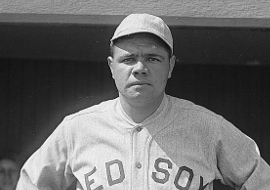About Stat Geek Baseball

About the Baseball Evaluation Decision Model System
Baseball Evaluation: From Doubleday to Eternity. Baseball Evaluation was developed to provide fans of baseball history with our take on Baseball Player Ratings, Comparative Statistics, and Salary Projections for all players in Baseball History, from the birth of the professional game in 1871 to the present day. At this time, the player grading and salary projection system shown here at baseballevaluation.com and Stat Geek Baseball is limited to the regular seasons during that span (work is continuing on postseason statistics), and does not include the Negro Leagues, although it is hoped at a future date to do both.
History of the Stat
The Stat Geel Baseball boxscore system provides baseball player stat grades for all pitchers and position players, for all years, in baseball history, scoring each season with a PEVA Player Grade total (see scoreboard below for explanation) that provides a peer to peer review that is accurate across all eras, whether dead ball, live ball, or steroid ball. How will your favorite players rank in the BE baseball history boxscore? Check out our yearly player grades, best ever lists of top pitchers and batters, or by teams of the present or past, and career lists, plus more to come. If you want to know even more about your favorite players, check into Stat Geek Baseball and the Career Track data for even more details, including full career PEVA, RAVE, and Salary Projections.
Over 4.4 million historical baseball statistics and 130,000 player years were reviewed in this study with more than 1.9 million new comparative statistics created, including Baseball Player Grades (PEVA), RAVE, EXPEQ, and SPRO.
No matter whether you're a fantasy baseball player, baseball historian, baseball player, sabermetrics fanatic, or just a rabid fan, take a look at the statistics calculated by the Baseball Evaluation model. There might be something here to pique your interest or help in that next fantasy draft or water cooler debate on the merits of players to be voted into the Hall of Fame in Cooperstown.
Over 4.4 million historical baseball statistics and 130,000 player years were reviewed in this study with more than 1.9 million new comparative statistics created, including Baseball Player Grades (PEVA), RAVE, EXPEQ, and SPRO.
No matter whether you're a fantasy baseball player, baseball historian, baseball player, sabermetrics fanatic, or just a rabid fan, take a look at the statistics calculated by the Baseball Evaluation model. There might be something here to pique your interest or help in that next fantasy draft or water cooler debate on the merits of players to be voted into the Hall of Fame in Cooperstown.
About Our Stats

The information provided on the Baseball Evaluation website and reports is for entertainment and information purposes only. It is a tool of comparison against other baseball player evaluations and values.
We started out with several simple premises. 1) That we would not attempt to reinvent the wheel, but instead, try to determine just how the wheel between statistical performance and player compensation truly worked. 2) While using the constant of player payroll as the means to keep us on track, we would attempt to develop a comprehensive player grading system that would accurately value those statistics, no matter what era a player had played in.
In the pages listed below, we will attempt to explain the system further. It is a system that has two main components. The PEVA Player Grade system, and the Stat Geek Baseball SPRO, Salary Projection, model, that is based on components of PEVA.
The Baseball Evaluation system was developed to provide a comparative tool that could value position players and pitchers with an index (PEVA and RAVE) that could be used to grade and compare players of different years and eras. It was developed with an eye toward how players were valued over the past fifteen years when comparing salary data to performance and experience level. Baseball Evaluation and Stat Geek Baseball also allows for salary projections (SPRO) for not only players of the present, but the historical past.
The questions have always been many among the fan community, whether it is when a player on their team is given a new contract or allowed to go the way of free agency. It is the main question in every debate about the merits of a past player to one of the present day. The Baseball Evaluation system allows for those comparisons, as well as new debates, on Player Evaluations and their relationships to other players and the salaries they are paid.
The model was developed without attempting to deviate from current norms within the baseball community, although certain deviations were inevitable. One fact emerged right from the start. It was an expected fact. Anyone with an eye toward baseball statistics knows that a player's value per salary and public perception is an exponential quantity compared to their actual statistics. Therefore, statistics are used in the Baseball Evaluation system in a comparative fashion with peer to peer yearly reviews that maintain that exponential relationship. This comparative peer system takes away the vagaries of comparing players of different eras, whether those of the dead ball, the live ball, or the steroid ball.
More About Our Stats

More About Us
Statistics are also not viewed in static terms, with, for example, a home run worth the same in 1870 as 1970. For a list of the comparative statistics used, see Baseball Evaluation: Methodology. In essense, the Baseball Evaluation System was developed to answer questions and provide new comparative statistics, although we realize that as many questions as it may answer, it likely raises even more.
PEVA Player Ratings Boxscore
Fantastic - 32.000 (MVP, Cy Young Candidate)
Great - 20.000
Very Good - 15.000 (All-Star Caliber)
Good - 10.000
Average - 3.500
PEVA Player Ratings Boxscore
Fantastic - 32.000 (MVP, Cy Young Candidate)
Great - 20.000
Very Good - 15.000 (All-Star Caliber)
Good - 10.000
Average - 3.500
History of America
Baseball Stat Books

-
Baseball's Best @ 150 Book
The newest book from Stat Geek Baseball at the 150th Anniversary of the Major Leagues (1871-2020) with more rankings than ever, Top 500 batters, Top 250 Pitchers, Top 150 Fielders at every position, plus Best Ever Ranks and more for all of your favorite franchises.
-

-
Fields of Gold, Baseball's Best Glove Work
The newest book in the Stat Geek Baseball universe. Fields of Gold, Baseball's Best Glove Work. It's what the Best Ever Book was for hitting and pitching, but now a detailed look at the Best Fielders in Baseball History, including best position players for every team, and best overall for every position
